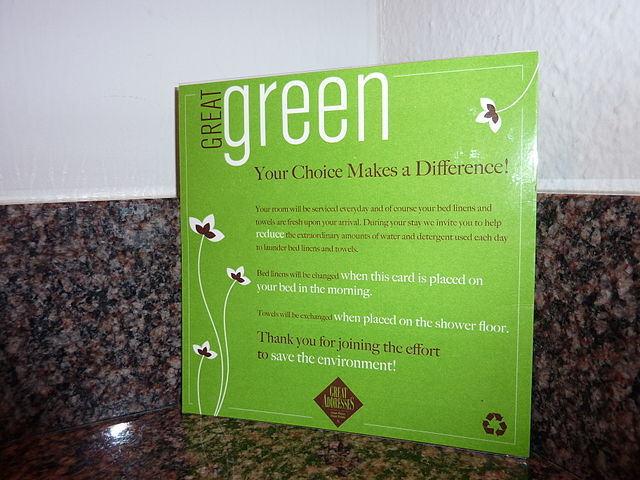
Image source: Teda13 via Wikipedia
Many corporations have assumed a leading role in educating the public about protecting the environment, in developing more environmentally-friendly products, and in positioning their products as “green.” Sometimes though positioning and promoting green products goes too far in a practice labelled as greenwashing.
The Public Relations Society of America (PRSA) defines greenwashing as portraying company products or actions as green while in practice the company takes the opposite actions. Greenpeace calls greenwashing “the cynical use of environmental themes to whitewash corporate misbehavior.” It vows to “confront deceptive greenwashing campaigns, engage companies in debate, and give consumers and activists and lawmakers the information and tools they need to confront corporate deception …”
In reality, the green claims are likely well-intentioned but misguided – a result of ignorance of environmental issues and laws and poorly-conceived PR or branding efforts. Consumer as well as investor preference for green brands and products pressures companies to publicize and promote their organizations and brands as environmentally friendly.
Lack of Knowledge Creates Severe Risks
Some PR as well as marketing and communications practitioners promote green claims without training in environmental regulations and issues. “Such poorly organised or inexperienced public relations efforts can create inappropriate or inaccurate green claims that mislead the consumer,” writes Angela Barter, public relations specialist and sustainable communication strategist, for PR Conversations. Whatever the cause, results can be severe. Risks include:
- irreparable brand and reputational damage,
- negative publicity,
- loss of stakeholder trust and investor confidence, and
- legal repercussions if companies violate a country’s advertising laws.
Inappropriate claims of being “green” can taint a company and brand. Overuse of environmental claims also increases the risk of “green fatigue” as consumers and investors become disinterested in a company’s messages.
Sins of Greenwashing
It’s essential for global brands to be familiar with advertising regulations of countries where they operate, Barter says. Terrachoice, an environmental consultant company, outlines guidelines in its 7 Sins of Greenwashing. They include:
- The hidden trade-off. Calling a product a green based on a few attributes while ignoring other important environmental issues.
- Lack of proof. Failing to substantiate claims.
- Vagueness. Staking a claim that’s so poorly defined or broad that it will probably be misunderstood.
- False labels. Words or images that give the impression of a third-party endorsement.
- Irrelevant claims. Claims that may be truthful but are irrelevant.
- Lesser of two evils. A claim that may be true within the product category but may distract the consumer from environmental impacts of the category, such as organic cigarettes or fuel-efficient sports-utility vehicle.
- Fibs. Claims that are simply false.
FTC Green Guides
US-based PR and marketing teams can study the FTC’s Green Guides. The FTC cautions companies against making unqualified claims that a product is environmentally friendly. Claims may suggest that the product has specific and far-reaching environmental benefits. However, the claims are nearly impossible to substantiate, and very few products, if any, can fulfill all the benefits that consumers perceive.
The guides also urge companies to:
• Not make an unqualified degradable claim for a solid waste product unless they can prove that the entire product or package will completely break down and return to nature within one year after customary disposal;
• Not make unqualified degradable claims for items destined for landfills, incinerators, or recycling facilities as these items will not degrade within a year; and
• Clarify guidance on compostable, ozone, recyclable, recycled content, and source reduction claims.
Bottom Line: Publicizing a company and its products as environmentally friendly can backfire and cause reputational damage and even regulatory penalties if green claims are false. To avoid greenwashing charges, it’s essential for a company and its PR staff understand environmental regulations and “walk the talk.”
William J. Comcowich founded and served as CEO of CyberAlert LLC, the predecessor of Glean.info. He is currently serving as Interim CEO and member of the Board of Directors. Glean.info provides customized media monitoring, media measurement and analytics solutions across all types of traditional and social media.




